Fleurs du Mal Magazine


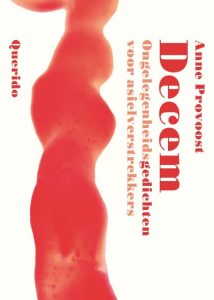 Een jongeman meent zich alles nog te herinneren: hij stapte in een bootje op zoek naar een land met een tandarts, zijn vrouw bleef in het water achter en werd door vissers begraven, en er was ook nog ergens een kind.
Een jongeman meent zich alles nog te herinneren: hij stapte in een bootje op zoek naar een land met een tandarts, zijn vrouw bleef in het water achter en werd door vissers begraven, en er was ook nog ergens een kind.
Door de shock verliest hij het zicht op de gebeurtenissen, maar zijn verblijfsvergunning hangt af van hoe geloofwaardig zijn rouw klinkt.
In een reeks ongelegenheidsgedichten veegt hij zijn ondervragers met cynische precisie de mantel uit.
Decem
Ongelegenheidsgedichten voor asielverstrekkers
Auteur: Anne Provoost
Poëzie
Bindwijze: Paperback
80 pagina’s
Druk 1e
Taal: Nederlands
Uitgeverij: Querido
NUR: 306
Paperback
ISBN: 9789025317836
Publicatiedatum: 26-09-2024
Prijs: € 20,00
• fleursdumal.nl magazine
More in: #Modern Poetry Archive, - Book News, - Bookstores, Archive O-P, Archive O-P

O, als ik dood zal zijn
“O, als ik dood zal, dood zal zijn
kom dan en fluister, fluister iets liefs,
mijn bleeke ogen zal ik opslaan
en ik zal niet verwonderd zijn.
En ik zal niet verwonderd zijn ;
in deze liefde zal de dood
alleen een slapen, slapen gerust
een wachten op u, een wachten zijn.”
En schokkende het grote zwichten
en armen die in vertwijfeling slaan,
een wringen omhoog, een biddend reiken,
een klemmen en jammerend laten gaan.
En een hoofd verwordende en bedolven
in der snikken en in der haren nacht,
wond over ondoorgrondlijke stroomen
vervreemd en doodswit opgebracht.
En een stem verwezen en ingezonken
en die nog stervende aanbad:
ik heb zoo zielsveel van je gehouden,
ik heb je zoo lief, zoo lief gehad.
J.H. Leopold
(1865-1925)
O, als ik dood zal zijn
• fleursdumal.nl magazine
More in: Archive K-L, Archive K-L, Leopold, J.H.

Na de dag
Het licht heeft je gezicht verweerd
en de marok wil met je aan de haal,
barok wordt rococo, de wijn creëert
de tralies voor de panter van de taal.
De wind steekt op, sirocco of simoem,
rhizomen worden schaars, de gentiaan
verdorst, de iris wordt een zonnebloem
en aan de hemel dient de maan zich aan.
Paul Bezembinder
Na de dag
Gedicht
Paul Bezembinder studeerde theoretische natuurkunde in Nijmegen. In zijn poëzie zoekt hij vooral in klassieke versvormen en thema’s naar de balans tussen serieuze poëzie, pastiche en smartlap. Bij uitgeverij Leeuwenhof (Oostburg) verschenen de bundels Gedichten (2020), Parkzicht (2020) en Duizelingen (2022). Website: www.paulbezembinder.nl.
• fleursdumal.nl magazine
More in: Archive A-B, Archive A-B, Bezembinder, Paul
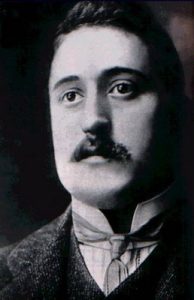
Il y a
Il y a des petits ponts épatants
Il y a mon cœur qui bat pour toi
Il y a une femme triste sur la route
Il y a un beau petit cottage dans un jardin
Il y a six soldats qui s’amusent comme des fous
Il y a mes yeux qui cherchent ton image
Il y a un petit bois charmant sur la colline
Et un vieux territorial pisse quand nous passons
Il y a un poète qui rêve au ptit Lou
Il y a un ptit Lou exquis dans ce grand Paris
Il y a une batterie dans une forêt
Il y a un berger qui paît ses moutons
Il y a ma vie qui t’appartient
Il y a mon porte-plume réservoir qui court, qui court
Il y a un rideau de peupliers délicat, délicat
Il y a toute ma vie passée qui est bien passée
Il y a des rues étroites à Menton où nous nous sommes aimés
Il y a une petite fille de Sospel qui fouette ses camarades
Il y a mon fouet de conducteur dans mon sac à avoine
Il y a des wagons belges sur la voie
Il y a mon amour
Il y a toute la vie
Je t’adore
Entre Bar-sur Aube et Troyes,
le 5 avril 1915
Guillaume Apollinaire
(1880 – 1918)
Il y a
Poèmes à Lou
• fleursdumal.nl magazine
More in: #Editors Choice Archiv, Apollinaire, Guillaume, Archive A-B, Archive A-B, Guillaume Apollinaire, Surrealism, Surrealisme

At the Door
I thought myself indeed secure,
So fast the door, so firm the lock;
But, lo! he toddling comes to lure
My parent ear with timorous knock.
My heart were stone could it withstand
The sweetness of my baby’s plea,—
That timorous, baby knocking and
“Please let me in,—it’s only me.”
I threw aside the unfinished book,
Regardless of its tempting charms,
And opening wide the door, I took
My laughing darling in my arms.
Who knows but in Eternity,
I, like a truant child, shall wait
The glories of a life to be,
Beyond the Heavenly Father’s gate?
And will that Heavenly Father heed
The truant’s supplicating cry,
As at the outer door I plead,
“‘T is I, O Father! only I”?
Eugene Field
(1850 – 1895)
At the Door
• fleursdumal.nl magazine
More in: Archive E-F, Archive E-F, Field, Eugene

Ik ben een zwerver overal
Ik ben een zwerver overal,
een doler en een vagebond
en een, die uit zich zelf geen pad,
geen ommekeer en geen uitweg vond.
Ik ben een napraatpapegaai,
ik ben een open spiegelrond,
des Eeuwigen gesproken woord,
het hapert in mijn stamelmond.
J.H. Leopold
(1865-1925)
Ik ben een zwerver overal
Oostersch IV
• fleursdumal.nl magazine
More in: Archive K-L, Archive K-L, Leopold, J.H.
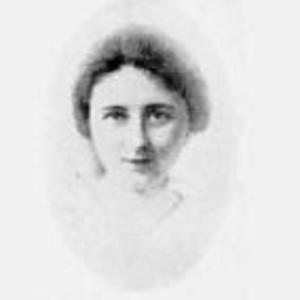
My window pane is broken
My window pane is broken
Just a bit
Where the small curtain doesn’t
Cover it.
And in the afternoon
I like to lie
And watch the pepper tree
Against the sky.
Pink berries and blue sky
And leaves and sun
Are very fair to rest
One’s eyes upon.
And my tired feet are resting
On the bed
And there’s a pillow under
My tired head.
Parties and balls and books
I know are best
But when I’ve finished work
I like to rest.
Lesbia Harford
(1891-1927)
My window pane is broken
• fleursdumal.nl magazine
More in: Archive G-H, Archive G-H, Feminism, Harford, Lesbia, Workers of the World
Be blown away by Van Gogh’s most spectacular paintings in a once-in-a-century exhibition.
Walk with a pair of lovers beneath a starry night. Look up at swirling clouds and cypress trees swaying in the wind. Stay a little while in Van Gogh’s favourite park, the ‘Poet’s Garden’, or under a shady tree in Saint-Rémy.
 The National Gallery is bringing together the most loved of Van Gogh’s paintings from across the globe, some of which are rarely seen in public. They will be paired together with his extraordinary drawings.
The National Gallery is bringing together the most loved of Van Gogh’s paintings from across the globe, some of which are rarely seen in public. They will be paired together with his extraordinary drawings.
Over just two years in the south of France, Vincent van Gogh revolutionised his style in a symphony of poetic colour and texture. He was inspired by poets, writers and artists. We look at this time in Arles and Saint-Rémy as a decisive period in his career. His desire to tell stories produced a landscape of poetic imagination and romantic love on an ambitious scale.
See up-close his ‘Starry Night over the Rhône’ (1888, Musée d’Orsay) and ‘The Yellow House’ (1888, Van Gogh Museum), as well as our own ‘Sunflowers’ (1888) and ‘Van Gogh’s Chair’ (1889), among many others and celebrate the 200th birthday of Van Gogh’s ‘Poets and Lovers’.
Van Gogh: Poets and Lovers
14 September 2024 – 19 January 2025
The National Gallery London
The National Gallery
Trafalgar Square
London
WC2N 5DN
• fleursdumal.nl magazine
More in: Archive G-H, Exhibition Archive, FDM in London, Vincent van Gogh, Vincent van Gogh

The Advertiser
I am an advertiser great!
In letters bold
The praises of my wares I sound,
Prosperity is my estate;
The people come,
The people goIn one continuous,
Surging flow.
They buy my goods and come again
And I’m the happiest of men;
And this the reason I relate,
I’m an advertiser great!
There is a shop across the way
Where ne’er is heard a human tread,
Where trade is paralyzed and dead,
With ne’er a customer a day.
The people come,
The people go,
But never there.
They do not know
There’s such a shop beneath the skies,
Because he does not advertise!
While I with pleasure contemplate
That I’m an advertiser great.
The secret of my fortune lies
In one small fact, which I may state,
Too many tradesmen learn too late,
If I have goods,
I advertise.Then people come
And people go
In constant streams,
For people know
That he who has good wares to sell
Will surely advertise them well;
And proudly I reiterate,
I am an advertiser great!
Eugene Field
(1850 – 1895)
The Advertiser
• fleursdumal.nl magazine
More in: Archive E-F, Archive E-F, Field, Eugene
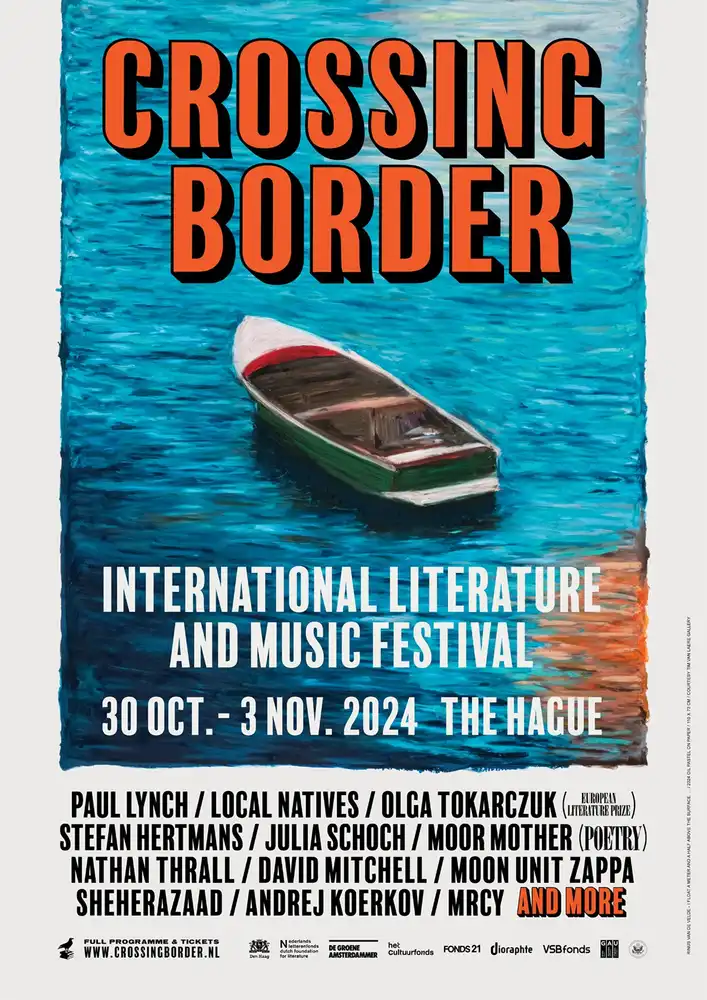
Van 30 oktober tot en met 3 november 2024 komen schrijvers en muzikanten uit binnen- en buitenland naar Den Haag voor de 32ste editie van het internationale literatuur- en muziekfestival Crossing Border.
Alexander Moto Amina Elmi Andrej Koerkov Anna de Bruyckere Anneleen van Offel Arad Dabiri Ariana Harwicz Asaf Luzon Ashley Ho Beatrice Alemagna Benjamin De Roover Bernardo Zannoni Carolina Trujillo Cherry Duyns Daria Serenko David Mitchell David Weel Django Duyns Don Duyns Edward van de Vendel Eva Montanari FaceSoul George Adegite Gery Mendes Ghayath Almadhoun Gianumberto Accinelli Hamraaz Hanneke van der Paardt Harmen van Liemt Hasan Gök (moderator) Hisham Matar Iris Penning Jean-Baptiste Andrea Jonas Eika Julia Schoch June McDoom Karl Marlantes Karol Lesman Kaveh Akbar LA LOM Leila Boukarim Lieke Maier Lilo Local Natives Loeke Vanhoutteghem Lotte Lentes Lucky Fonz III M. Seppola Simonsen Mahat Arab Malachy Tallack Marc Majewski Marilena van der Pol Marthe van Bronkhorst Mina Etemad (moderator) Mohana van den Kroonenberg Moon Unit Zappa Moor Mother MRCY Munganyende Naaz Nathan Thrall Nicole Kaandorp Nikki Dekker Noah de Campos Neto Noha Saré Oana Maria Brumă Okkervil River Olga Tokarczuk Paul Lynch Peter Alexander Jobson Rachel Rumai Diaz (moderator) Reg Desard and Vale Richtje Reinsma Rinske Bouwman Robin Lindqwister Viker Rui-Jun Luong Safae El Khannoussi Sai Rodrigeus Sana Valiulina Sheherazaad Sjaan Flikweert Slobodan Šnajder Sofie Verdoodt Solvej Balle Sophia Blyden Soukaïna Bennani Stefan Hertmans Steff Geelen Stuart Murdoch (Belle & Sebastian) The Antlers Thomas Heerma van Voss Twan Vet Vanessa Kisuule Vera Morina Vlinder Verouden
CROSSING BORDER
International Literature & Music Festival The Hague
30 OCT – 3 NOV 2024
https://www.crossingborder.nl/
• fleursdumal.nl magazine
More in: - Book Lovers, - Book News, - Bookstores, Art & Literature News, Crossing Border, Literary Events, LITERARY MAGAZINES, Magazines, MUSIC
Stedelijk Museum Schiedam presenteert dit najaar Adya en Otto. Pioniers binnen de avant-garde, een tentoonstelling over het bijzondere leven en werk van het kunstenaarsechtpaar Otto van Rees (1884-1957) en Adya van Rees-Dutilh (1876-1959).
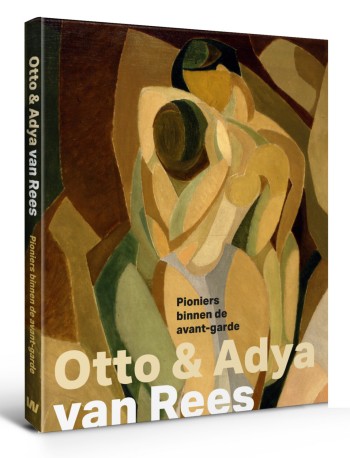 Ze zijn in hun vroege jaren, als pril gezin, omringd door bekende kunstenaars als Arp, Mondriaan en Picasso. In deze tijd leveren zij een unieke bijdrage aan beeldbepalende stromingen zoals dada en kubisme en het ontstaan van abstracte kunst. Adya en Otto waren al tijdens hun leven bekend in toonaangevende kringen van kenners en kunstenaars. Toch is hun werk nog relatief onbekend bij het grote publiek.
Ze zijn in hun vroege jaren, als pril gezin, omringd door bekende kunstenaars als Arp, Mondriaan en Picasso. In deze tijd leveren zij een unieke bijdrage aan beeldbepalende stromingen zoals dada en kubisme en het ontstaan van abstracte kunst. Adya en Otto waren al tijdens hun leven bekend in toonaangevende kringen van kenners en kunstenaars. Toch is hun werk nog relatief onbekend bij het grote publiek.
Als wegbereiders van de 20ste-eeuwse moderne kunst krijgen deze kunstenaars in Stedelijk Museum Schiedam alsnog een eerbetoon. Met ruim zeventig werken uit hun pionierende jaren is voor het eerst sinds bijna vijftig jaar een groot overzicht van Adya en Otto samen in een tentoonstelling te zien. Met speciale aandacht voor Adya, die als vrouwelijke kunstenaar in de door mannen gedomineerde kunstgeschiedenis van de twintigste eeuw niet de waardering heeft gekregen die ze verdient.
Adya Dutilh (1876 – 1959) en Otto van Rees (1884 – 1957) ontmoeten elkaar rond 1902 in Blaricum waar Otto’s vader een landbouwkolonie heeft gesticht. Adya is acht jaar ouder dan Otto en heeft gedegen teken- en schilderlessen gevolgd in Brussel. Otto maakt zijn HBS-opleiding niet af, maar krijgt wel schilderlessen. Op aanraden van kunstenaar Jan Toorop vertrekt Otto in 1904 naar Parijs, al snel gevolgd door Adya. Daar wonen ze, te midden van internationale avant-garde kunstenaars, in het ateliergebouw Bateau-Lavoir in Montmartre en later op diverse adressen in kunstenaarswijk Montparnasse.
Publicatie Otto & Adya. Pioniers binnen de avant-garde: Bij de tentoonstelling verschijnt de publicatie Otto & Adya van Rees. Pioniers binnen de avant-garde, van de auteur Irène Lesparre op initiatief van de Van Rees Stichting in samenwerking met Waanders Uitgevers. Het boek is gericht op de periode waarin het werk van zowel Otto als Adya een dynamische ontwikkeling naar abstractie doormaakt, voortkomend uit cloisonnisme, kubisme en dada. De aandacht die onder andere besteed wordt aan de reacties op hun werk door recensenten, publiek en kunstbroeders schept een duidelijk beeld van hun pionierspositie. Prijs €24,95.
Adya en Otto
Pioniers binnen de avant-garde
Stedelijk Museum Schiedam
28 september 2024 t/m 2 maart 2025
Stedelijk Museum Schiedam
Hoogstraat 112
3111 HL Schiedam
+31 (0)10 246 3666
info@stedelijkmuseumschiedam.nl
www.stedelijkmuseumschiedam.nl
• fleursdumal.nl magazine
More in: - Book News, - Bookstores, Adya & Otto van Rees, Archive Q-R, Art & Literature News, Dada, Dadaïsme, Exhibition Archive, Expressionism, Expressionisme, Kubisme, Modernisme

Machinist’s Song
The foot of my machine
Sails up and down
Upon the blue of this
fine lady’s gown.
Sail quickly, little boat,
With gifts for me,
Night and the goldy
streets and liberty.
Lesbia Harford
(1891-1927)
Machinist’s Song
• fleursdumal.nl magazine
More in: Archive G-H, Archive G-H, Harford, Lesbia, Workers of the World
Thank you for reading Fleurs du Mal - magazine for art & literature